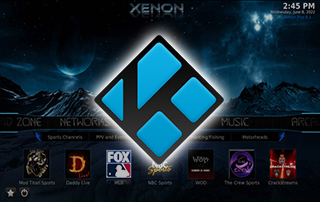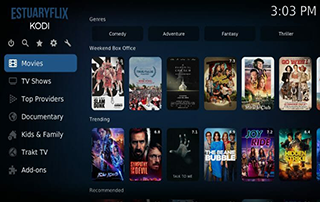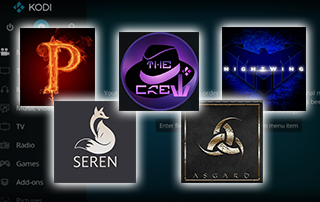
This IPTV Wire news article discusses Kodi 21 Omega’s launch.
The Kodi development team has officially published Kodi 21 Omega, the third Alpha iteration of this program.
Please be aware that the most recent stable version of this well-known program is Kodi 20.2 Nexus. Since Kodi 20.2 Nexus is the stable release, we advise using it for the best results.
We will give you all the necessary release information in this article, including instructions on how to set up Kodi 21 Omega on your preferred device.
One of the most widely used media centers and streaming apps is Kodi, which is utilized by millions of people worldwide.

The most popular platforms for installing this software are Android, Windows, Linux, Mac, iOS, Amazon Firestick, and Fire TV.
It’s important to note that not all Kodi add-ons and builds have been tested with Kodi 21 Omega by our reviews team.

We will finally test everything, so we advise you to bookmark our website to stay updated on the findings.
We advise waiting for the results of our tests before updating Kodi if you are currently running any version of Kodi 20 Nexus and it is doing well for you.
There are a number of new capabilities that Kodi 21 Omega adds to this well-known program. In a short amount of time, the engineers did a tremendous job of resolving a lot of bugs.
The Alpha release notes for Kodi 21 Omega may be found below. These were taken straight from the Kodi website.
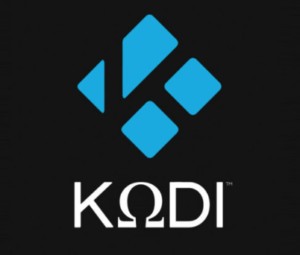
Details and Features of Kodi 21 Omega
Three Alpha Release
On September 9, 2023, Kodi 21 Omega’s “Alpha Three” release was published.
Estuary
@ksooo has modified Estuary to include “more…” in size-restricted lists. Homescreen widgets with more than 15 items will notice the impact of this.
A number of adjustments have been made to enable video data for TV seasons and movie sets.
FFmpeg
Our FFmpeg library usage has been fixed in a number of ways by @popcornmix. This has undergone multiple versions and has variedly impacted seeking and playback. Hopefully the last of these regressions has now been eliminated, but if you continue to suffer regressions when using FFmpeg for playback, let us know.
Filesystem
To increase data performance, @thexai modified the chunk size of data requests for local media, increasing it to 64kb.
Games
The Kodi gaming interface is constantly being improved by @garbear. There have been updates to player management and assignment at https://github.com/xbmc/xbmc/pull/23548. Check out that PR for more information.
General
Using a whack-a-mole strategy, @ksooo has continued to tackle problems with menu usage throughout the Kodi codebase. Some of the most recent improvements include ones for music video information dialog issues, “Local art” missing from the art selection dialog, and other problems with art dialog selection.
The LISTITEM_IS_RESUMABLE property now makes the “in progress” status of TV Shows, Seasons, Movie Sets, and Recording Folders visible.
The current season and episode that is being refreshed are now displayed in the refresh progress box, making it more informative for the user.
A (lingering) PR from @repojohnray that solves a memory leak in context menus has been merged.
By @neo1973, certain enhancements and optimizations have been performed. Database and curl consumption are two areas that are impacted, therefore any performance improvements are definitely valued.
In order to make additional eagerly awaited modifications, @rmrector has been researching how Kodi uses photos (caching, allowing remote viewing of images that haven’t been displayed in Kodi, preloading of images, and general simplification of the API). He has already implemented a number of improvements.
Platform Particulars
Android: @quietvoid’s PR has been merged, making it possible to playback select Dolby Vision media types by converting them to more widely used formats. For more information and any comments/support on the feature, see the forum thread that has been around for testing and can explain the advantages a little better than this blog editor: @fritsch has once more delved into our Audio Engine to correct a regression for Amazon FireTV 4K users: https://forum.kodi.tv/showthread.php?tid=371557. @joseluismarti has further updated several Android dependencies and fixed/modernized portions of our Android API usage at https://github.com/xbmc/xbmc/pull/23687.
Linux:
There is now support for cpu_thermal hwmon. This makes it possible for gadgets like the Raspberry Pi to report CPU temperatures devoid of the need for additional scripts (as has traditionally been the case with initiatives like LibreELEC).
A patch for VAAPI VP9 Profile 2 playback was reported by @smp79.
macOS:
@kambala-When you press the Caps-Lock key, Kodi crashes in the SDL versions of decapitator. Although the “native windowing” version of Kodi that we switched to for the v21 nightlies was unaffected, this should make utilizing that key easier if you are building for x86_64 Intel Macs.
@enen92 he continues to make improvements to Kodi for macOS. Attempts have been made to speed up and more correctly portray network data, such as the DNS servers used.
Due to our use of a library that does not support Apple Silicon devices, macOS temperature information is not yet available on such devices. @enen92 changed the way he reported CPU/GPU temps, now reporting N/A rather than 0.0.
On macOS, media keys are now accepted.
The Kodi app window can now be moved from high-DPI screens with different refresh rates thanks to a few upgrades.
The “native windowing” system is now the default setting in new versions of macOS.
webOS
@sundermann has continued with more webOS port improvements, mostly in passthrough and video decoding.
Windows:
@thexai has merged a PR designed to address a problem where the Windows platform frequently loses track of the audio output device. This should strengthen Windows audio outputs in scenarios where driver updates might cause name changes.
In particular, @CrystalP has been donating a number of fixes and enhancements for Windows. Among these is a repair for refresh rate switching for graphics cards made by Intel and Nvidia that was unintentionally broken by a fix for AMD cards.
The recently added Video Super Resolution implementation has undergone more upgrades.
PVR
A PR to add a “2 minute” option to the padding timer for PVR recordings been merged thanks to a first-time contributor named @ivanllc.
Kodi PVR continues to become better thanks to @ksooo. The fixes and cleanups from the static analysis tools (cppcheck and clang-tidy) were among the numerous changes that were made.
Fixed a long-standing issue where the subtitle choice was lost when the channel playback restarted.
Python
Modifications to enable the construction of Kodi using Python 3.12.
Thanks to @scott967, the Python invoker now delivers the sys.argv arguments to Python addons in a logical order.
Skinning
https://github.com/xbmc/xbmc/pull/22993 is a patch made by @smfontes that enables loading of font sets defined in a skins/fonts folder.
Subtitles
There is now support for.ttc font collections.
Video
With at least one started element (episodes, movies, recordings) but no fully watched ones, TV show groups (seasons, movie sets, PVR recording folders) are now regarded as “in progress” and, as such, appear, for instance, in the corresponding “In progress” GUI elements, such as widgets and video windows.
The last played date and fixed play counts (watched status) of episodes and movies are not kept after internet updates.
Fixed default video select action.
VideoPlayer
A patch to switch from the yadiff to the bwdif deinterlacer in the FFmpeg package has been made by @alanswanson. According to reports, this performs far better than the previous interlacing technique.
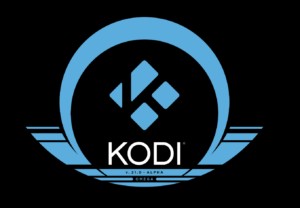
Second Alpha Release
On June 18, 2023, Kodi 21 Omega’s “Alpha Two” release was posted.
Build/Dependencies
All current Apple platforms are developed utilizing a more recent version of Xcode (14.2) and the appropriate SDKs. We have been able to decommission our aging Intel Mac minis that have been in use for a long time thanks to a combination of a new M1 Mac mini hardware donation from longtime project sponsor MacMiniVault.com and the Kodi foundation acquiring a second M1 Mac mini.
Instead of our previous (outdated) packaged wget executable, building on Windows now uses the system’s curl executable.
@lrusak has made adjustments to dependency building to strengthen the downloading/hash checking.
Estuary
The seek window timeouts have been improved to more accurately vanish after the proper timeouts.
@ksooo fixed the ‘next recording’ label in PVRTimers so that it is now visible.
FFmpeg
@neo1973, one of our more recent team members, has cleaned up and solved various crashes in our use of ffmpeg side data and made other enhancements to our ffmpeg API usage.
General
The handling of movement keys (such as PageUp, Down, Home, and End) has been improved. @rmrector has been working to enhance the management of picture cache for GUI elements. We anticipate the additional work he has planned to enhance cache handling.
When upgrading, advancedsettings.xml configurations for Kodi 18 will no longer be transferred to the new GUI settings. Verify that the artwork settings in the GUI correspond to your preferences if you had meaningful configuration there. Instead of resetting the selection to the top of the list after playback finished or altering an item’s watched status, @CrystalP expanded the navigation history to track the line number of the selected item. This way, it may be recovered after the item vanishes from the list.
Pictures in portrait orientation no longer produce incorrect thumbnails. To have fresh, accurate thumbnails made, the previous ones in KODI_HOME/userdata/Thumbnails/* must be erased.
JSON-RPC
VideoLibrary.The “studio” and “genre” parameters added by @scott967 in https://github.com/xbmc/xbmc/pull/23112 are now returned by GetEpisodeDetails.
Platform of Specifics
Android: @joseluismarti has kept up with more code cleanups and enhancements for Android. Each advancement facilitates management and is much valued.
Further enhancements to AudioTrack have been made by @fritsch to handle hardware with sinks that become “stuck”. Making changes in the Android environment is always tricky because there are so many hardware vendors and the common Android APIs are implemented in so many different ways.
Linux: @lrusak has made it possible for users to choose the audio backend when launching Kodi by using a command line switch. This makes it possible to inspect the audio backends Kodi was built using. Visit the aforementioned PR for further details.
macOS: Mojave (10.14) is now the bare minimum OS requirement for Kodi on macOS. To enable the project to continue utilising more recent C++ 17 capabilities, this was done. On September 24, 2018, macOS Mojave was released, and Apple.com lists the devices that it supports.
The “Native windowing” for our macOS codebase, which will eventually result in an official Apple Silicon version, has been further improved by @enen92. window resizing, menus, window blanking, multiple monitor support, and other improvements.
For programmers, running Kodi from Xcode is now simpler and doesn’t require changing any schemes.
In order to fix a crash that occurred when the microphone was activated, @ksooo has now correctly added Speechrecognition entitlements for Apple systems (including iOS/tvOS).
The native windowing version now supports HiDPI resolutions, such as those advertised as Retina displays. Because to this improvement, Kodi’s graphical user interface (GUI) can display greater pixel densities, giving it a professional appearance on current Macs.
The new webOS platform has seen more advancements thanks to @sundermann and @craigcarnell. Updates to codec hardware support, audio sink enhancements, and screensaver support have all been made.
Windows: Windows 8.1 is now the minimum version that is supported.
Windows HDR/SDR/HLG display has been improved by @CrystalP and @thexai in a variety of ways, including tonemapping and hardware DXVA support for various combinations of those media types.
Support for “Video Super Resolution” was added by @thexai for Nvidia (RTX) and Intel (ARC) compatible hardware. Please be aware that as we obviously can’t test every possible hardware configuration, you shouldn’t expect this to function with every possible setup. Try it out, then report any problems along with debug logs.
An upgrade to libdav1d version 1.20 should enhance Windows platforms’ support for AV1 playback.
Python
@lrusak has made a patch for a defect that pushes addon paths ahead of system paths. This resolves the issue by using system modules with the same names as prospective customized Kodi modules. Linux-based systems are mainly affected by this.
Alpha One Launch
On April 25, 2023, Kodi 21 Omega’s “Alpha one” release was published.
Build/Dependencies
Some users have fixed GCC13’s build support. Kodi can now be built using more recent toolchains that have refactored some header entries.
Several generic version bumps have been done for a number of dependencies for the platforms Android/Apple/CI. Thank you, @fuzzard and @craigcarnell.
Some of the Android/Apple/CI dependent systems have been improved to function better and handle various states by @lrusak.
A couple cmake deprecations and pkgconfig detection problems have been resolved by @Rechi.
Documentation
Some of our contributing guideline documentation, according to some new authors, was inadequate. A few people have made contributions in an effort to improve their utility and informational value.
Some of the Ubuntu build documentation has been changed by @fixthething to reflect some contemporary package names used in more recent Ubuntu releases.
FFmpeg
Use FFmpeg upstream. This is a significant accomplishment that makes future FFmpeg updates simpler.
A 6.0 update is required. This aligns us with the most recent FFmpeg version. For Linux distro support, compatibility with 5.1.x has been maintained.
Filesystem
Users soon identified a number of problems after NFSv4 functionality was added. Many of them have been resolved by @thexai, including timeouts and default chunk sizes for NFSv4.
General
In order to address issues like memory leaks and efficiency improvements, @repojonray has offered a lot of general fixes/improvements to various locations.
A lot of developers have worked to modernize certain Kodi features. Users won’t see a lot of this effort, but it is making Kodi’s massive amount of code more maintainable in the long run. @neo1973, @repojohnray, @enen92, @lrusak, and @Rechi.
Added option to turn off screensaver when audio is playing.
The UX has been improved in various ways by @DeltaMikeCharlie in regard to date format choices.
Games
The Retroplayer ecosystem is constantly being improved by a number of developers and consumers. Many thanks to @garbear and @KOPRajs.
JSON-RPC
The field Video.Fields.Episodes now includes the genre.
Music
Include the ability to read (and write) M3U8 playlist files. The playlist files now have UTF-8 character support, which allows for non-ASCII characters.
Platform of Specifics
Android: Dolby Vision identification and compatibility have been improved. MKV containers now accept DV, and different DV profiles are handled better with a fallback to HDR10 when possible and DV support is not present. We can now support hardware tone mapping of DV profiles 4, 5, to SDR for some devices. Different Android devices support different profiles; for instance, the 2019 Shield supports profiles 4, 5, 7, and 8 in DV and HDR10 fallback (profiles 7, 8), but not HW tone mapping to SDR. Similar to the Fire TV Stick, which only supports profile 5’s HW tone mapping to SDR (profiles 4, 5, and 8 are supported with DV display), profile 7 is not supported by the Fire TV Stick.
minimize shutdown functionality was implemented in Power Saving settings.
Numerous minor internal adjustments and the use of more recent Android APIs to replace older ones.
A variety of Android-specific features are being gradually updated/improved by @joseluismarti to keep the project compliant with Google Play Store submission standards.
iOS/TVOS: When using the iPhone Apple TV Remote app linked to an Apple TV, Channel Up/Down keys are now supported.
Linux:
Pipewire: Correct implementation for correct AudioEngine compatibility.
Passthrough formats should be added. HD audio formats like DTS-HD and TrueHD are included in this.
GBM: Include libdisplay-info support to aid in the parsing of EDID data and the identification of display capabilities.
macOS: @enen92 has been steadily enhancing many aspects of the Nexus-introduced native windowing implementation for macOS, including mouse, resizing, menu bar, shortcut key handling, etc. Currently, this functionality is not used in the official macOS versions, but thanks to enen92’s work, we are getting closer to making it the default for v21.
Handling of CD/DVD drives in macOS has been improved. Additionally, this enables M1-based workstations to reliably read drives.
Minimum Windows Windows 8.1 is now the highest supported version of Windows.
We will now use displays’ familiar names in settings, if they are accessible (for example, “LG TV #1”).
When the display is in HDR PQ mode, a setting was added to use the Windows HDR/SDR brightness balancing setting for the GUI and subtitles. The internal method GUI SDR max peak luminance curve was also enhanced.
enhanced read performance via SMB in a few unique situations, such as playing whole Blu-ray folders.
The ability to run on some constrained VM hardware (Hyper-V) even without video decoding capabilities has been improved.
Several changes have been made to the DXVA render process to prevent compatibility issues with outdated hardware or Windows 8, especially when using sources that use the BT.2020 color space.
Support for DXVA2 AV1 hardware video decoding at the 8-bit and 10-bit levels was implemented.
To enable the usage of more recent SDKs from Visual Studio, certain SDK requirements for developing UWP packages have been removed.
Picture
Resolve security concerns with picture EXIF metadata that have been found. Additional changes have also been backported from Kodi’s upstream EXIF data processing library.
PVR
Include the option to order channel groups whichever you like.
Settings
Regressions in Settings visibility have been fixed in several ways.
Subtitles:
In order to maintain Kodi v19 behavior, the display of MKV files having text subtitle entries without the duration defined on the Matroska block was fixed. This also applies to the Teletext to srt autoconversion carried out by PVR backends (such as tvheadend).
Subtitle offset has been fixed when auto-close video OSD is selected.
As problems with the new subtitle system are reported, @CastagnaIT has remained available to support and resolve them.
UPnP:
improved UPnP Kodi library display and browsing compatibility with official smart TV applications.
When playing or refreshing UPnP products, fix the artwork.
Because everything in this development is open-source, you can also see the GitHub information.
On your selected Kodi device, Kodi 21 Omega can be installed in a few different ways.
The download page on the official Kodi website is the best place to start when downloading Kodi 21 Omega.
Under Downloads, click Prerelease, then choose ARMV7A (32BIT).



